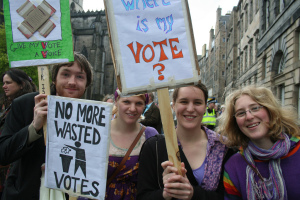It’s time for London to get votes that matter

In this year’s local elections, once again, voters got the councillors they didn’t elect. I’m being flippant, of course some of them were people that they’d voted for – but the UK’s creaking electoral system disenfranchised millions of voters.
If you’re reading this, you’re probably familiar with the UK electoral system – known as ‘First Past the Post’. The idea being that you have a choice of people and the one or ones who get the most votes wins. However, that breaks down when you stop thinking about the individual and start thinking of the political party that is being elected into office.
For example, in Hackney the Green Party won 20% of the vote (coming second) but 0% of seats. This was repeated in Manchester, Islington, Lambeth, Lewisham, and Southwark. Significant votes cast by people resulted in no Green candidate being elected. In rural areas, the situation is true for Labour where they will often get 5 – 10% of the vote but no seats on local councils.
It’s also healthy for political parties to face political competition. I was recently at a Radical Housing Network conference on London’s housing crisis and how some Labour councils had embarked on unpopular redevelopments of social housing, whilst others had followed a different path. One of the speakers said, aside from very local factors, the big factor was that councils which had ‘always been Labour’ were more likely to pursue unpopular housing policies. There was no competing political force to stop them.
The ability for Labour and Greens to provide effective opposition to perennial Conservative Councils could also provide a progressive alternative to UKIP. One of UKIP’s key messages is that power has been taken away from local people by elites in Europe – showing people that their local votes make a difference could help to undermine that narrative and breath life into local democracy.
But won’t this new electoral system be confusing? Well, Northern Ireland introduced proportional representation in local elections since the 1970 to tackle election-fixing. Scotland has had proportional representation since 2007 in local elections and since 1999 in the Scottish Parliament elections. As has London, where the Assembly elections are done through proportional representation.
Hackney, Islington, Haringey, Camden, Southwark, and Lambeth actually all voted in favour of changing the UK parliamentary electoral system to AV in 2011. So there’s a clear local desire for electoral reform, as well as a political case to reform our aged electoral system. Isn’t it time we got rid of this relic of a system and stepped into the 21st Century?
Support Hackney Green Party’s petition for fair local elections by signing the petition: https://you.38degrees.org.uk/p




Leave a Reply